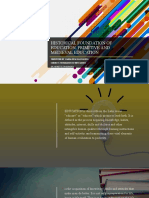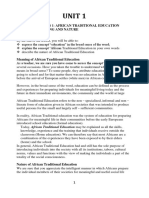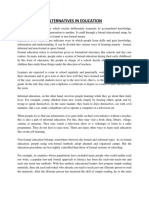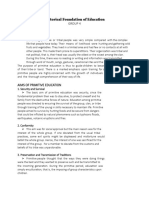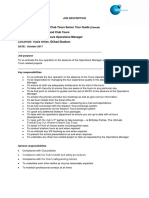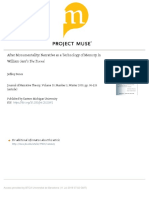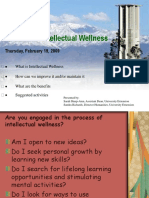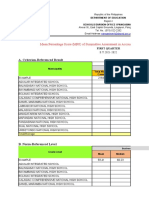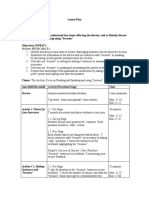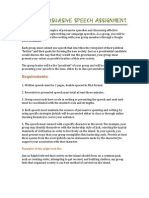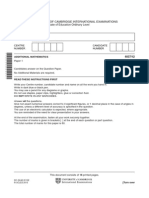EDUCATION
There are many definitions used for the term education by different writers, some of the common
definitions are as follows:
It is the transmission of accumulated knowledge and wisdom of society from one generation
to another.
It relates to all the accumulated experiences that one goes through in life. It is ‘what happens
to us from the day we are born to the day we die’. We are at all times being educated as
children or adults even if we do not go to school.
It is the acquisition of useful knowledge, understanding, skills, and values. It is very
important for the development process as it helps the individual and the society to reach their
full potential.
It is a lifelong process of learning in different situations.
It can also be defined as all those activities which involve teaching and learning.
It can also be seen as a process through which a person’s mind and character are developed
and skills imparted.
TYPES OF EDUCATION
There are two broad forms of Education;
1. Traditional Education
2. Modern Education
These can further be subdivided into formal and non-formal education.
There is however, informal education which has always been there in traditional education and is
also found even in modern education.
1. TRADITIONAL EDUCATION
It is a process which involves one learning about his /her own society’s culture, values and
beliefs. Children were being prepared for both adulthood and a place in society.
CHARACTERISTICS
Knowledge is passed on by word of mouth that is orally.
All parents have the responsibility of teaching children the customs, values and norms of the
society.
Education is gender based i.e women taught girls while men taught boys.
Learning takes place everywhere.
Most of the education is practically based, with the young copying from the old.
Specialized skills are a closely guarded family secret with them being passed on from parent
to child. e.g Pottery, traditional medicine, blacksmith, witchcraft, etc.
Emphasis is on social responsibilities for both boys and girls; For example,
Boys were expected to;
- respect elders, provide for the family, plough fields, look after cattle and hunt.
Girls were expected to;
- respect elders and their husbands, look after crops and perform domestic duties such as
washing, cooking, child rearing etc, bear children for their husbands and the tribe.
All children learnt moral values such as respect, honesty and consideration which encouraged the
stability of their communities.
Children were taught through stories, poetry, songs, dances, ceremonies proverbs, riddles, tribal
legends and rituals.
1
�Children also learnt about their physical environment as they became in contact with it through
herding cattle, hunting and cultivating crops.
This kind of education takes place everyday, as people in the community pass on their knowledge
to the children. This can be termed informal traditional education. Many African societies also
had separate initiation schools for girls and boys which one can term formal traditional education.
Teenagers would spend several weeks or months away from their village learning about adult life,
and on their return they would be treated as adults and could marry. Eg. Bogwera and Bojale in
Botswana.
Advantages of traditional education
Customs and values were passed down from one generation to another as a result societies
were kept stable and culture preserved.
Learning particular roles in societies meant that everyone felt they belonged to the
community as a result fitted well in the society and knew what was expected of them.
People learnt to be proud of their traditional culture.
It taught children to respect their tradition.
It was a more practical education that enabled children to acquire survival skills such as
crafts, cooking and hunting.
It was cheap to run as no advanced infrastructure or technology was needed.
Disadvantages of traditional education
Boys and girls were expected to learn skills based on gender rather than on their natural
abilities.
Knowledge was static as instruction was practical without any theoretical thinking
Traditional education often looked to the past, rather than the future.
People were not taught how to adapt to change or solve new problems but were rather taught
to stick to their traditions
The Initiation schools teaching led to harsh treatment of learners which sometimes led to
serious injuries or even death.
It is difficult to keep knowledge forever as traditional education is not written but orally
taught therefore it suffers distortion and forgetfulness
Boys and girls learnt to behave exactly like their fathers and mothers.
Traditional education is inadequate to ensure development. With population increase and
economic modernisation, it is increasingly becoming difficult for those without a modern formal
education to find jobs and to have a healthy standard of living.
2. MODERN EDUCATION
This is education that focuses on the written word, which means there is now a greater emphasis
on literacy (reading and writing). Today education is seen as a passport to modern life and
wealth. It helps us to adapt to changes as our countries develop, but also to value and understand
our traditional culture.
Modern education can be divided into two main systems:
1. Formal education
2. Non-formal education
2
�Formal education
This refers to the learning that takes place in schools and training institutions. Ever since
production and technology became more complex and people specialised in different jobs, formal
education has been widely adopted. It has set out skills or knowledge which can be tested and
graded through examinations. There are trained instructors/teachers who teach this formal
education.
Provision of education in a country can be measured by using:
The literacy rate (% of people who can read and write).
The primary and secondary school enrolment.
The number of students attending universities or other institutions for further studies.
CHARACTERISTICS
It is based on reading and writing as a means of passing on information.
It is a well-planned process with distinct stages eg primary, secondary etc.
There are specially trained teachers for each stage.
Learning takes place in institutions e.g colleges, schools.
Pupils are taught both local and global issues.
There are strict age requirements.
Education is Co-educational, ie. Both boys and girls attend the same schools and taught
the same skills.
The curriculum is wide, ie. Many subjects are offered.
The role /advantages / importance of modern formal education
It gives people self-esteem and self-confidence as they develop their unique abilities.
It helps each person to reach his or her full potential.
It teaches people problem solving and decision making skills.
It makes people more adaptable to change.
It encourages people to participate in politics and development.
Improves the literacy rate (% of people who can read and write).
It gives people equal access to job opportunities.
It trains people for an appropriate career.
It teaches everyone how to read and write.
It develops and builds the nation.
It creates awareness on local and global issues.
Without education particularly, literacy, the rate of development remains slow. An illiterate
person is likely to be poor, unemployed, hungry and vulnerable to disease. This in turn leads to
underdevelopment of a country, as the human resources in the country fails to reach their full
potential.
Vicious circle of underdevelopment
Lack of resources
3
� Lack of money for
development Lack of
educational UNDER-
DEVELOPMENT achievement
Poverty
Lack of trained
and skilled workers
When education achieves the roles that it is supposed to, it has many advantages for the
individual and the nation. The World Bank states that the education of women is the most
important determinant of health; the infant mortality rate falls for every year a woman spends at
school. “ If you educate a man you educate an individual but if you educate a woman you educate
a nation.”
Disadvantages of formal education
The curriculum is based on the needs of the former coloniser, and the needs of the local
community are sidelined.( Euro-centric curriculum)
Courses are based on overseas syllabus
There is usually a short supply of trained teachers.
It is expensive to run, as it requires infrastructure, manpower, books, laboratories etc
The poorest suffer most as they are unable to pay for their children’s school fees .
Lack of basic resources such as books lowers educational achievement.
It encourages rote learning (memorisation) to pass exams, rather than practical skills to
improve people’s quality of life.
It promotes individualism.
Traditional values are lost as people interact with people from other cultures and some either
look down upon their culture or challenge some aspects of their tradition/culture which are
valuable for a society.
It encourages migration, which sometimes leads to family breakups.
It has a tendency to put more emphasis on acquiring Certificates at the expense of knowledge
and practical skills to improve people’s quality of life.
It creates a lot of competition therefore leads to inequalities which creates socio-economic
classes i.e division between the rich and the poor
Non-formal education (out of school education)
This is a type of education that takes place outside school.
CHARACTERISTICS
Learning takes place at any convenient place such as outdoors, in someone’s home or
work place etc.
It takes place at any age
Learning is on part time basis
Teachers may be volunteers from the society
Sometimes emphasis is on giving people skills e.g literacy, cooking, sewing etc.
Certification and examinations are less important in most cases.
4
�Examples of non-formal education
a) Distance education
People can extend their school education by taking distance education courses; they can use
books and materials, which are sent through the post. Some distance learning courses also use
television and radio courses to reach people. This learning is a very good method to reach
learners in remote parts of the world. People can study for certificates and degrees through
distance learning. This is becoming even easier with the growth of information technology eg
Correspondence Courses: BOCODOL, corresponding with Universities or high institutions of
Learning.
b) Literacy programmes:
This involves teaching young people and adults who have been unable learn how to read and
write at school. Trained teachers or community members could be involved in literacy classes.
c) Agricultural education
Agricultural extension workers visit farmers to instruct and demonstrate farming skills such as
growing crops, raising animal, applying fertilisers etc.
d) Health Education
Health workers, who are normally trained by nurses and doctors, teach people about health issues.
A specific important job done by health workers is educating mothers at the ante-natal and post
natal clinics. eg. Mothers are taught how to feed and care for their babies and keep them healthy.
For example, can be taught the importance of breastfeeding and the disadvantages of bottle
feeding their children; importance of immunization; teaching people about the prevention of
mother to child transmission of HIV/AIDS.
ALTERNATIVE APPROACHES TO THE PROVISION OF EDUCATION IN
BOTSWANA
1. Vocational and technical training
This is the learning of specific skills such as bricklaying, plumbing, book keeping, dress making
etc that can help people gain employment and consequently help individuals as well as the
process of development. Most Newly Industrialised countries have focused on technical training
so that their communities develop a skilled work force. In Botswana we have VTC’s eg.
Madirelo Training Centre, Gaborone Technical College, Brigades
2. Job Shadowing
Job shadowing is work- based learning whereby students visit a work place and observe a person
do the work and can ask questions concerning that job.
The purpose of Job shadowing;
To provide students/ learners with an opportunity to learn first hand about the world of work
To provide students with a chance to explore specific jobs/careers that interest them
Exposes students to the realities and demands of the work place and expectations of the
employer
It is strategy that prepares students for employment
Opens students minds to non-academic pursuits such as skilled trades which are good yet
often looked down upon
5
�3.On the Job Training
This is training that takes place at work through workshops and seminars. This is done to improve
employees’ skills and accommodate changes.
3. Informal education
This refers to what we learn from our families and friends through interacting with them in
everyday life. This is very similar to traditional education, and it is one of the ways in which we
learn about our culture. This type of education is indirect as we learn things without actually
knowing that we are learning. It happens right from the day we are born, for example a small
child copies and imitates the people around him, he learns how to talk, walk, and play and so on.
THE IMPACT OF INFORMATION TECHNOLOGY EDUCATION ON THE
DEVELOPMENT OF BOTSWANA
What is Information Technology?
It is the use of electronic gadgets such as computers and telephones which interact with skills and
knowledge to communicate, process, store, update, receive and send data.
IMPACT/EFFECTS OF INFORMATION TECHNOLOGY
POSITIVE
It ensures high productivity as work is done faster and also enables people to work fewer
hours.
It also ensures higher productivity as machines can operate longer hours just being monitored
and controlled by computers.
It has made possible production of products which can only be produced through IT as a
result life becomes easier. eg Credit Cards, air traffic control
New jobs have been created with introduction of IT eg programming, network managing
The school curriculum has been broadened with introduction of a new subject Computer
Studies and also subjects like Design & Tech now use computers as part of their syllabus.
The computers can monitor the performance of their users eg in supermarkets they can tell
the management about the number of customers dealt with per hour or how many items
passed through the scanner that day.
It is an important weapon to fight against crime as cameras scan shops, there are speed
cameras for those breaking traffic laws
There has been an elimination of files which could easily be misplaced as information is now
stored in computers and there is easy access to it.
There is also convenience of working at home therefore some people travel less to the office
thus reducing petrol consumption and air pollution.
The use of electronic office means a lot of paper is saved therefore few trees are needed to
make paper so trees are saved from being felled.
There is less/reduced wastage in Industrial production/process as machines are more accurate
than human labour.
People take less sums of money as credit cards are more convenient and the risk of being
robbed is reduced. It is thus unnecessary to queue in the banks as ATM’s are readily
available.
6
�NEGATIVE
It leads to unemployment as use of IT replaces human labour when some aspects of
production are computerised
The new jobs created by the use of IT are only for skilled and qualified people
The storage of personal data held in computers have eroded people’s privacy
The gap is widened between those countries which are able to afford the new technologies
and those that are unable to afford the technology.
Some children addicted to computer games have their social and educational development
affected as some become violent having copied such behaviors from those games
Credit cards are only for people who are working and have steady income so certain people
are unable to enjoy such a service
People easily get into debts as they spend more that they can afford with the use of credit
card.
Sometimes its harder to keep track of how much you have spent as statements are sent once a
month
Hacking is also common- people gain access to other people’s computer system and some
make illegal transactions in the banks.
Software theft-there is a tendency to steal software
It can bring inconvenience if computer is fed with wrong information.
How Does IT contribute to development?
-storing information
-faster communication ie internet /e-mail
-computer studies on the school curriculum
HOW EDUCATION CONTRIBUTES TO DEVELOPMENT
Basic education improves worker performance in industry and agriculture. It provides
necessary skills for self-employment and entrepreneurship. Moreover it trains the workers of
the future.
Education can help prevent diseases that are linked with human behaviour such as AIDS.
It can help prevent degradation of the environment because it creates awareness of the
environmental issues. Education also helps delay marriage; also females with basic education
tend to have fewer children than those with lack of education. The chances of survival of
children also increase with increased female education.
Education is important in developing human resources. An educated person can take part in
the political, social and economic decision making in his country. Besides, literacy
encourages participation; it also helps the spread of technology.
Education increases health education and chances of adopting family planning methods thus
reducing rapid population growth and its problems.
It brings about personal fulfillment and reduces poverty.
Education produces people who can develop and invent new and appropriate technology for
their societies, and this is particularly relevant to developing countries, which still have low
levels of technology.
EDUCATION IN BOTSWANA
7
�Botswana is a very good example of a country that has achieved a very rapid expansion in
education since the 1980’s. When Botswana got its independence in 1966 it was one of the
poorest countries in Africa. This also reflected in its education provision, which was very low,
more than 2/3 of the population were illiterate.
POLICY OBJECTIVES
The major objectives of education in Botswana are to:
Increase educational opportunities.
Give everyone access to education.
Train people for all sectors of the economy.
Promote personal qualities such as respect for national ideals, co-operation, self-reliance,
gender equality, concern for others.
Formal education in Botswana is organised on a 7-3-2 year system since 1998. This was a
reorganisation from the 7-2-3 system. It is projected that by the end of this year (2004) 50% of
the students would be in senior secondary schools. There are 27 government owned senior
secondary schools at the present moment. Education has been provided at Zero cost to all
Batswana from standard one to form five until December 2005. However, there has been the
reintroduction of school fees at the beginning of 2006 in junior and senior secondary
schools.Junior secondary schools pay P300.00 per year while senior schools it is P450.00 per
year. Technical colleges pay P 750.00 per year.
In tertiary education, the government operates a system of grants and loans starting from 1995.
The system primarily based on the manpower needs of different sectors of the economy. Students
studying technical and science-based courses receive more financial support because they are
regarded as essential to the development of the country.
Provision of education to a nation is very expensive because schools have to be built, equipped,
maintained and teachers have to be trained, housed and paid for their labour. Private schools can
alleviate the situation by working in partnership with the government. Private schools are
however, expensive since they are owned and run by business people who are after making profit.
THE ROLE OF EDUCATION IN ADDRESSING THE PROBLEMS OF HIV/AIDS
Education is very important in addressing HIV/AIDS since both formal and non-formal education
make people aware of the cause, symptoms and the ways of transmission and the effects of
HIV/AIDS. Most subjects in schools include topics on AIDS. Others learn by reading books,
newspapers, listening to the radio, and watching television. People know how to prevent this
disease through education.
Those who take care of HIV/AIDS patients are taught different preventive measures that they
should apply to avoid being infected by the disease. The search for the HIV cure requires
education because people have to do research in different ways for example experimenting by
administering the medicine on monkeys. Anti-retro viral drugs have been discovered through
education.
The Ministry of Education has a TV HIV/AIDS program called TALK BACK which is
broadcasted every Tuesday from 1200-1300hrs. The Ministry of Education has tried to equip all
schools-(primary and secondary) with TV, VCR and DECODER so that all schools record this
program and teachers in turn teach students or allow students to watch the program after school.
8
�ENVIRONMENTAL EDUCATION
What is environmental education?
It is a lifelong process which encourages awareness, understanding and appreciation of our
surroundings.
Importance of;
It helps children/students to be responsible for the environment they live in.
Students will understand how the environment functions
Helps people to appreciate how much we depend on our natural resources to survive and the
need to conserve them.
Environmental education supplies the tools needed to protect our environment for future
generations
People need to have knowledge about their environment and how it works.
People become aware of the effects of the environment on their lives and their effect on the
environment.
How does environmental education relate to sustainable development?
How does environmental education relate to conservation practices?
State the Conservation societies that you know
How does environmental education relate to vision 2016?
Vision 2016 states that;
Economic growth and development in Botswana will be sustainable.
Renewable resources will be used at a rate that is in balance with their regeneration capacity
Non-renewable resources such as minerals will be used efficiently
There will be a fully integrated approach towards conservation and development.
The key natural resources and assets will be distributed equally among the population
Communities will be involved in the use and preservation of their environmental assets



























